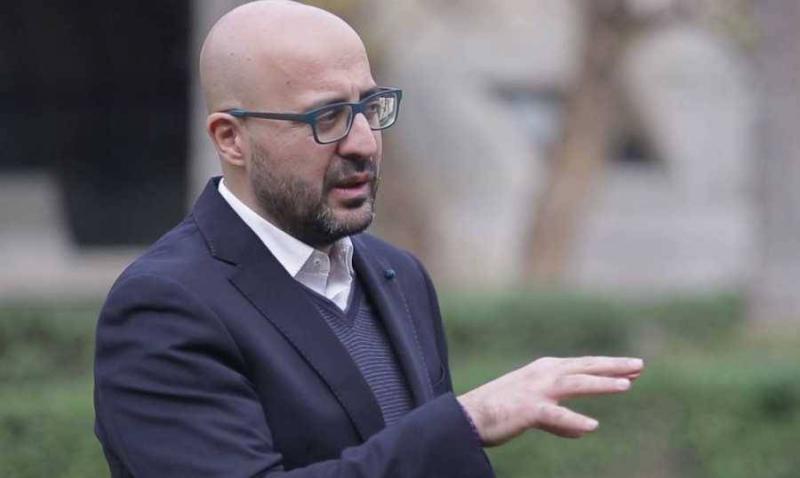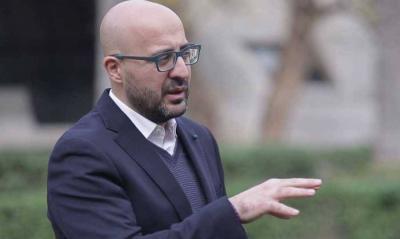With the escalation of the war in Gaza and the potential spillover effects on the situation in Lebanon, the caretaker government has proactively implemented an emergency plan through a crisis cell that distributes tasks across eight sectors, including: shelter centers and ensuring their protection and social stability, essential food supplies, necessary health supplies, cash assistance, and logistical matters concerning roads and water. However, the paradox is that the capacity of all sectors to cope with the crisis and face its challenges will not exceed two to three months at most, and the biggest challenge facing the plan is the continued provision of fuel.
Caretaker Prime Minister Najib Mikati has tasked Environment Minister Nasser Yassin with coordinating the emergency plan and working with United Nations organizations and relevant authorities. To learn more about the details of the emergency plan and its main challenges, "Nidaa al-Watan" interviewed Minister Yassin, who detailed the plan's components as follows:
**First, Shelter Centers:** "We must identify the locations of shelter centers. A number of centers have been designated for use, starting with unused schools that the Ministry of Education has put at our disposal. We are currently working to identify the shortcomings of these centers in cooperation with ministries and international organizations, but we are also looking into other shelter options. The Ministry of Youth and Sports has provided us with large scout centers, and UNRWA has also allocated 16 schools for use."
**Shelter Centers for 200,000 People:** Yassin adds, "We have drawn upon the experience of the July 2006 war, conducting a simulation of the numbers. We estimated the proportion of citizens who may need shelter centers, and those who may rent homes or go to relatives in other areas. In the 2006 war, approximately 20% of the displaced sought shelter centers while around 80% rented homes or sought refuge with relatives or friends, totaling about 800,000 displaced persons. Today, we are working under an assumption of nearly one million displaced persons or more, and we are still working to determine dedicated shelter centers for at least 200,000 people. Coordination regarding the shelter centers involves ministries such as Social Affairs and Education, noting that the designation of these centers is tied to local governors and administrations, and the Red Cross has a crucial role alongside specialized international organizations in this matter."
**400,000 Food Rations:** "Second, securing food. This involves coordinating with the World Food Program, which has an established system with several associations and international organizations. The collaboration includes the Ministries of Social Affairs, Interior, Economy, and Agriculture, and relevant international organizations to ensure the distribution of rations and provide financial support to cover food costs." Yassin clarifies that "the available rations in our warehouses currently number about 400,000, sufficient for about a month, but we need to increase this number. The goal is a scenario that provides food rations for a million displaced persons."
**Five Mobile Clinics:** "Third, health supplies and medicine. This is one of the most important sectors in an emergency. Currently, there is cooperation between the Ministry of Health and partners such as the World Health Organization, UNICEF, and the Red Cross. We have identified essential medical needs and secured five mobile clinics. The quantity of available medicines is sufficient for a period ranging from one month to two months, and we are working to enhance and increase this quantity, noting that our coordination efforts are on a positive track, with challenges related to the cost of medications and securing fuel for hospitals."
**Water Secured for 3 Months:** "Fourth, securing water and basic sanitation supplies. Work is underway in coordination with UNICEF and the Ministries of Energy, Environment, and water institutions to enhance how water is secured for shelter centers, as well as to provide chlorine and improve pumping capabilities at water stations to maintain cleanliness in centers. We can provide water for about three months, and the challenge in this sector is how to supply fuel to these stations to ensure they can continue operations for an extended period of 45 days to two months." Yassin adds, "These are the four core sectors, and the plan we have developed allows us to be prepared to face events and emergency situations for a duration ranging from 45 days to three months, but we strive to increase stockpiles if necessary in shelters, food, or medications to sustain us in the event the crisis and security issues extend."
**Logistical Matters:** "Fifth, logistical issues involve ensuring protection for roads to deliver assistance in the event of an attack, as well as securing flour and fuel supplies, along with communication, and how to secure imported materials related to food, fuel, and medicines in the event a blockade is imposed on us. Coordination here includes the Ministries of Public Works, Energy, Communications, the World Food Program representative appointed by the UN, and certainly security forces including the army and internal security, with several scenarios discussed."
**Continued Cash Assistance:** "Sixth, ensuring the continuation of cash assistance for the poorest families through the 'Aman' program, which currently supports 93,500 families, as well as the national program for supporting the poorest families benefiting 75,000 families, which are programs under the Ministry of Social Affairs. There are plans today to enhance these programs and ensure their continuity, with the possibility of increasing the number of families benefiting, especially displaced families that will be affected by any attack if it occurs."
**Protection of Shelter Centers:** "The seventh and eighth components are interconnected and relate to shelter centers, where efforts are ongoing to ensure and enhance protection for these centers, particularly for children present there and raising their awareness. Coordination is taking place between the Ministry of Social Affairs and some international organizations. Additionally, social stability is considered to prevent any form of tension during this period."
Minister Yassin summarizes the plan, stating it consists of "eight cells from which several operational cells emerge effectively, designed to manage the crisis," also noting that "there is ongoing monitoring of the communications issue and its continuity with the Ministry of Communications and Ogero."
**A Core Cell:** In addition to all these factors and cells, there is a core and vital cell concerning "rescue operations, firefighting, and debris removal in affected areas, where studies are underway to enhance the capacities and efforts of the Civil Defense, Red Cross, and associations working in this field."
**The Fuel Dilemma:** He emphasizes that "the challenges are significant and not easy, with the most prominent being securing a sufficient amount of fuel, especially for hospitals, bakeries, and water stations, where imports typically last for 15 days."
**Future Steps:** According to Yassin, the next step is "to put together budgets within the framework of a simulation to ensure the essential needs of around one million people in the event of any aggression, thus each relevant ministry has been asked to submit its budget to devise a plan in the event that approximately one million Lebanese are displaced and the crisis lasts between one and 45 days to be ready." Regarding funding sources, he clarifies that "part will be secured from credits that the government will open, with this process having started with the Ministry of Health and the Council of the South, while the other part will be secured through requests for additional assistance."
**Unifying Cells:** In parallel with this work, efforts are being made "to unify the crisis cell rooms or operational cells at the local level through the governors. Today, there are operations rooms and committees for disaster management in Tyre, Nabatieh, Hasbaya, Sidon, Jezzine, Zahrani, Western Bekaa, and Zahle. These were formed in cooperation with the Ministry of Interior, governors, and district heads, and municipal unions. These cells constitute the executive framework for all plans across all sectors, and in the event of displacement, the implementation of plans will occur at the local level. Planning and coordination are centralized, but execution is decentralized, and agreement has been reached to unify "data" and have a single platform affiliated with all organizations and ministries," Yassin points out.
**Syrian Displaced Persons:** Regarding Syrian displaced persons, especially those in southern hot areas, he notes that "there are many proposals, but the responsibility lies with international organizations and institutions, and discussions are currently taking place to explore all proposed options to make the appropriate decision."
**Meeting Tomorrow:** He mentions that "tomorrow, Tuesday, a joint session will be held chaired by Speaker Nabih Berri with the presence of the committees on finance and budget, administration and justice, national defense, interior and municipalities, public health and labor and social affairs, education, higher education and culture, national economy, trade, and industry, planning, media and communications, public works and transportation, energy and water, displaced affairs, human rights, women and children, and the environment, to discuss the government's emergency plan to address the repercussions of the Israeli aggression, where each minister will present the data from their ministry."




